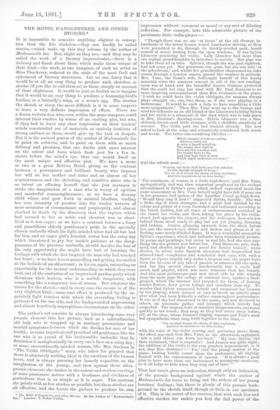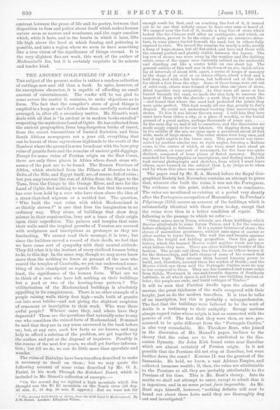THE HOTEL D'ANGLETERRE, AND OTHER STORIES.*
IT is impossible to conceive anything slighter in concep- tion than the five sketches,—they can hardly be called stories,—which make up this tiny volume by the author of Mademoiselle Die. But, slight as they are,—and they may be called the work of a literary impressionist,—there is a delicacy and finish about them which make them unique of their kind,—the work, as one imagines, of such an artist as Miss Thackeray, reduced to the scale of the most frail and ephemeral of literary structures. Let no one fancy that it would be at all an easy thing to produce such sketches, or stories (if you like to call them so) as these, simply on account of their slightness. It would be just as foolish as to imagine that it would be an easy thing to produce a humming-bird's feather, or a butterfly's wing, or a wren's egg. The shorter the sketch or story, the more difficult is it in some respects to leave a very definite impression of effect. There are a dozen writers, too, who, even within the same compass, could interest their readers by virtue of an exciting plot, but who, if they had to leave any clear impression on their readers' minds constructed out of materials so entirely destitute of strong outlines as these, would give up the task in despair. But it is the natural genius of the author of Mademoiselle Ize to paint on cobwebs, and to paint on them with so much delicacy and precision, that one dwells with more interest on the colour and form which flash just for a few in- stants before the mind's eye, than one would dwell on the most unique and effective plot. We have a scene or two at a great Riviera Hotel, giving us the contrast between a peremptory and brilliant beauty who imposes her will on her mother and sister and on almost all her acquaintances, and the shrinking and sensitive sister who is so intent on effacing herself that she just manages to strike the imagination of a man who is weary of egotism and masterful commonplacenesa ; or we have a dreamy child whose soul goes forth in musical idealism, reading her own intensity of passion into the weaker natures of mere creatures of circumstance and propinquity, and almost shocked to death by the discovery that the rapture which had seemed to her so noble and elevated was as short- lived as it was eager; or we have a contrast between a fussy and punctilious elderly gentleman's pride in the specially chosen umbrella which his light-minded niece had all but lost for him, and an eager girl's feverish terror lest the rainy day which threatened to ,try her uncle's patience at the disap- pearance of his precious umbrella, should involve the loss of the only opportunity she might have had of learning the feelings with which she had inspired the man who had touched her heart ; or we have lovers quarrelling and getting reconciled at the bedside of an old servant ; or lovers, again, extracting an opportunity for the mutual understanding on which they were bent, out of the confusion of an improvised garden-party which threatens their hostess, who is a malade imaginaire, with something like a temporary loss of reason. But whatever the excuse for the sketch,—and in every case the excuse is of the very slightest kind,—some rare effect is produced by the ex- quisitely light touches with which the overruling feeling is portrayed on the one side, and the background of unpromising and almost hopelessly unpropitious circumstance on the other.
The author's art consists in always introducing some very prosaic element into her picture, such as a valetudinarian old lady who is wrapped up in sanitary precautions and morbid symptoms between which she divides her care of her health ; or some impatient and practical old gentleman like the one who is so proud of his businesslike umbrella that he flourishes it metaphorically in every one's face on a rainy day ; or some conventionally minded woman, like Mrs. Graham in "The Violin Obbligato" story, who takes for granted that there is absolutely nothing ideal in the emotions of the human heart, and is always pressing her homely sagacities on the imagination of the young ; and then against these ultra- prosaic elements she dashes in the ardent and restless cravings of some passionate nature with a freshness and vividness of portraiture that is as simple as it is eager. This contrast she paints with as few strokes as possible, but these strokes are all effective, and she leaves the picture to produce its own The Intel d'Angleterre, and other Stories. By the Author of' Mademoiselle lie." London: T. Fisher Unwin.
impression without comment or moral or any sort of diluting reflection. For example, take this admirable picture of the passionate little violin-player :—
" Though there was no one at home' at the old Grange, in- habitants of the newer houses round Leachester driving, as they were permitted to do, through its thickly-wooded park, heard
sounds of music issuing from the open windows. It was Sylvia Llanover practising her violin. Lady Llanover had more than one orphan granddaughter to introduce to society. Her plan was to take them all in turn. Sylvia's, though she was past eighteen, had not come yet. Her governess was gone, but she was still 'in the schoolroom,' and, whilst her grandmother chaperoned an elder cousin through a London season, passed the summer in solitude. Mrs. Vane, the Dean's wife, bethought herself of this lonely musician when the amateur concert in aid of the new reading- room was at hand, and the beautiful Jessica Graham protested
that she could not sing her duet with Mr. Paul Seymour to no more inspiring accompaniment than Mrs. Graham's on the piano. I wish we could have the violin obbligato, for mamma always plays straight on; one, two, three, as if she were playing to a metronome. It would be such a help to have something a little more sympathetic.' Then Mrs. Vane went up to the Grange and used her influence as an old friend of the Llanovers to bring Sylvia and her violin to a rehearsal of the duet which was to take place in Mrs. Graham's drawing-room. Sylvia Llanover was a fine- skinned, brown-eyed little creature, with a childlike simplicity of manner. The violin part she had studied already. She now
asked to look at the song, and attentively considered both music and words. The latter ran something like this :—
'Whore summer &ends are sailing
Above a sunlit sea A voles is heard bewailing The winter thst shall be How sad this ceaseless gel For beauty born to die, And that high bliss of noon Which night enshrouds too soon!'
And the refrain went :--
0 sweet, our faith shall hold one fort untakon In this eternal triumph of decay;
For we sh.11 breast the storm of time unshaken, And love to-morrow as we love to-day.'
'The sentiment, of course, is a little high-flown,' said Mrs. Vane, apologetically, and was then somewhat perplexed by the evident astonishment in Sylvia's eyes, which indeed expressed much the same amazement as Mrs. Vane herself might have felt if some one in her presence had spoken of the Apostles' Creed as high-flown. Would they sing it now P' suggested Sylvia, timidly. She was a little shy of these strangers and a good deal dazzled by the colour and glitter of a room furnished and bedizened according to the latest fashion, but all trace of embarrassment vanished as she tuned her violin, and then, taking her place by the violin- stand, just opposite the singers, and the wide-open door-window behind them, stood ready to play but not yet playing, listening and looking. Jessica, glancing upwards from the sheet before her, saw the earnest eyes dilate and darken and gleam as if re- flecting some newly-kindled flame. It was a wonderful moment in Sylvia's experience, which had hitherto been remarkably prosaic. In poems and paintings, but never in real life, had she soon any- thing like the picture now before her. Paul Seymour, pale, dark- eyed, and slender, might have posed for Romeo himself ; while Jessica, to whom some Spanish ancestors had bequeathed her almond-hued complexion and wonderful dark eyes, with such a figure as ripens usually only under a tropical sun, she might have been the heroine of any talc of passion or romance till she spoke, and her lips curved almost involuntarily into a smile half sweet, half playful, which was more winsome than her beauty. And this most picturesque pair now stood side by side singing from the same page the eulogy of constant love, against a back- ground, which the summer had prepared for them, of flaming scarlet flowers, dewy green foliage and cloudless June sky. No wonder that Sylvia surpassed herself and surprised her hearers by her playing, which seemed at once to throw an artistic grace over what had been hitherto a rather commonplace performance. It was as if she had discovered in the music, and now disclosed to others, an alternate pathos and triumph which nobody had suspected. The singers, both of sensitive temperaments, answered quickly to her touch; they sang as they had never sung before till, at the close, where Jessica's ringing soprano and Paul's weak but sympathetic tenor rang forth together in the lines,— ' For we shall breast the storm of time unshaken,
And love to-morrow as we love to-day,'
with the voice of the violin soaring and quivering above them, the effect was such that Mrs. Vane, as she afterwards explained, felt a cold shiver run down her back." My dear Sylvia,' she then exclaimed, 'that is exquisite ! And Jessica was quite right ; the addition of the violin is the very greatest improvement, is it not, dear Mrs. Graham P Yes,' said the plump matron at the piano, looking kindly round upon the performers, all slightly flushed with the consciousness of success. 'It is always a good plan to have more than one instrument to accompany amateurs, as it all helps to hide when they sing out of tune.'
That last touch gives an indication, though only an indication,
of the prosaic background against which the author of Mademoiselle Ire loves to bring out the ardour of her young heroines' feelings; but there is plenty of this prosaic back- ground in the sketch itself, though so little in our specimen of it. This is the secret of her success, that with such few and effective strokes she makes you feel the full power of the contrast between the prose of life and its poetry, between that disposition to fuss and potter about itself which makes human nature seem so narrow and wearisome, and the eager emotion which, while it lasts, and in the hearts in which it lasts, lifts life high above the level at which fussing and pottering is possible, and into a region where we seem to have something like a true vision of the significance of things eternal. It is the very slightest fine-art work, this work of the author of Mademoiselle Ixe, but it is certainly exquisite in its minute and tender kind.



































 Previous page
Previous page